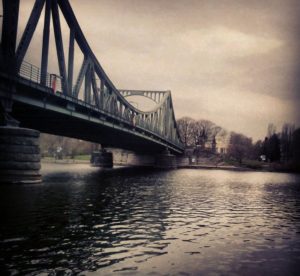I hope that you enjoy this guest post. The Rowing Concierge helped Jill find a rowing club when she moved from Minneapolis to Berlin for a year. To read more of her posts about rowing and life in Berlin, please see http://jmazlostinberlin.wordpress.com/category/rowing/ – Ruth
October 3 is coming up. It’s a national holiday here, when schools and offices will be closed. I didn’t know what the holiday was for until yesterday, and now that I do, a few other things begin to make more sense.
The holiday is Unity Day. It’s a day to commemorate the 1990 reunification of Germany.
I am beginning to understand that the Cold War and Reunification have a far greater hold on the psyche of Berliners today than World War II does. Which is interesting, because if you’re anything like me, your ideas about Germany have been shaped by the steady stream of literature and films that dwell on the dark years of the 1930s and ’40s.

Photo credit: Havelritter.de
But if you live here and you happen to be my age, then half your life was spent before Germany was reunified, when Berlin still had a Wall and you could be shot for crossing a border. This may be unimaginable to me, but it’s real and present in the memories of most of those around me.
As you get to know Berliners, they’ll tell you of how they arranged their lives within these confines, the awkwardness of getting around a divided city, even where they could and could not row.
A conversation in a quad yesterday helped me understand this from a perspective I could relate to—that of someone in a boat.
I was in two seat of a women’s quad, and we’d rowed to the point where the club members tend to turn around; doubling back from there results in a 16 km. row. It’s a beautiful spot, and our bow has just pointed out to me that the German movie stars of the 1920s, people like Marlene Dietrich, once lived in the mansions that rise above the trees along the shore.
As we sat resting at the turnaround point, drifting toward shore, the bow told me about how these mansions sat empty and abandoned during the Cold War, as they were too close to the border, and that in fact the border was just ahead of us, around the bend, by the fabled Glienicke Bridge. She told me that before 1989 they could row only up to this point where we were now, and no further. The GDR would patrol the waters in their boats, following the rowers, watching them through their binoculars. They knew that if they rowed to the border or across it, they risked being shot.
She told me she remembers one time the men’s club, Berliner Ruder-Club, situated just a few kilometers south of our club, rowed an 8+ over the border and into East Germany before they were officially allowed to, and were not shot—and how rowers from all the clubs along the Wannsee cheered their bravery and success. And she remembers the first time she herself was able to row across the border a few months later.
I craned my neck to see her face as she told me these things, this striking woman who is roughly my age, and it came to me that in 1989 I was rowing freely on the west branch of the Susquehanna in central Pennsylvania, the waters calm and mostly clear of boat traffic of any kind.
Just around the bend beyond where we drifted was the famous Glienecke Bridge she told me about, where the U.S. and the Soviet Union exchanged captured spies and endures to this day as a site of intrigue and myth.
After the row, over lunch in the club’s café, I learned that on October 3 there would be a long and grueling race that my lunch partner would not be participating in, but perhaps I would like to try it, a 15 km. race that takes you along this same course but continues past the Glienicke Bridge, across the border into former East Germany, and in a loop around a large island and back to the boathouse.
The race took on greater significance to me now that I understood it involved a crossing of the border on Unity Day.
I may just have to participate in this race, though I hear it is chaotic, where all the boats start at the same time and are gunning for the best positions to row through the narrow channels and make the turn around the island. My friend said she’d rowed it before and had no appetite for enduring that again. Though I know it will be long and painful, the draw of seeing what’s just around the bend, to get closer to some sense of what lives so large in the memory of those around me—to cross the border with a crew of Berliners on German Unity Day—would surely be worth the pain of a race.


Jill
I am planning a European tour for a few friends who enjoy rowing for exercise and fun. We are all in our late 50s and row regularly on the Hunter River in NSW Australia near the port of Newcastle.
At present I am in Berlin for a couple of days and noticed rowing pontoons at Wannsee. My desire is to row with locals for a morning row in Berlin, Luzern, Austria and Italy. We are all experienced scullers.
Could you put me in contact with a suitable club in Berlin who could accommodate our future needs?
Cheers
Richard
Hi Jill~
I’ve just moved to Berlin (from CA via NYC) with my boyfriend, David, and found your name on rowingtravelblog.com as it has always been a dream of mine to row. I hope this isn’t too forward, but I would be delighted to meet you over coffee one day if your schedule permits.
We’re here for at least two years and, at 52 with no children, Berlin immersion has its challenges. I love the outdoors, helping others, public transportation, a good conversation, cooking and live music. David has two daughters, 10 and 16 who will be visiting us for several weeks this summer so I’d like to meet others with children as well.
While in the corporate world for 20+ years, I was most recently a Realtor in CA until moving to NYC last year. And, ironically, one of my dear friends is an urban planner, recently retired.
Take care and I look forward to hearing from you.
Desiree
Hi Desiree,
I am delighted that you found Rowing The World and best wishes for rowing in Berlin. I will pass your message along to Jill.
Best,
Ruth